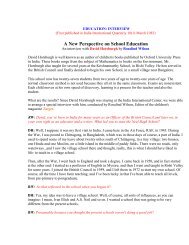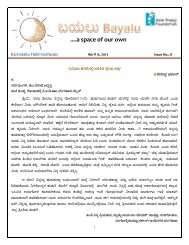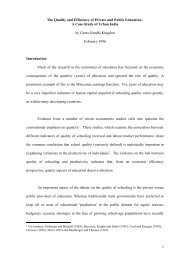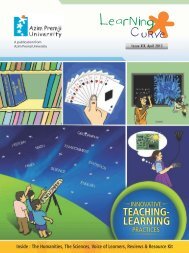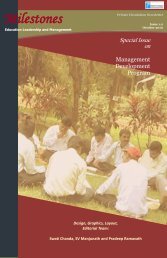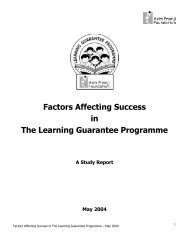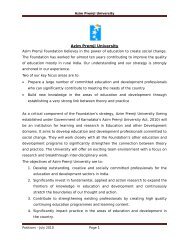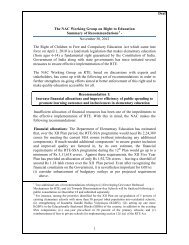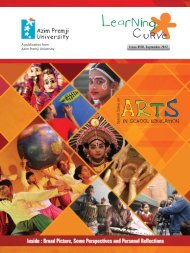Indesign Pagesnew.indd - Azim Premji Foundation
Indesign Pagesnew.indd - Azim Premji Foundation
Indesign Pagesnew.indd - Azim Premji Foundation
Create successful ePaper yourself
Turn your PDF publications into a flip-book with our unique Google optimized e-Paper software.
The Value<br />
With reference to the experience quoted above, how did it<br />
enrich the learning experience of the children? The fi eld trip<br />
gave them an authentic experience that interested them,<br />
engaged them and raised their curiosity. Such exposures<br />
give students an opportunity to engage with the world<br />
outside their classroom, discovering things for themselves,<br />
analyzing facts (very often confused with interpretation),<br />
refl ecting upon a situation, answering questions, and often<br />
coming up with original solutions. It also exposes them to<br />
multiple perspectives of people.<br />
In a typical project, groups of students work together<br />
toward the common goal of exploring and understanding<br />
something. Student performance can be based on the<br />
quality of the outcome produced, the depth of content<br />
understanding demonstrated, and the contributions made to<br />
the ongoing process of learning. Students may or may not be<br />
assessed individually. Most importantly, they create a scope<br />
for students to refl ect upon their own ideas and opinions,<br />
think critically, make their choices, voice their opinion and<br />
therefore make intelligent decisions. Such experiences also<br />
help in developing a deeper understanding of the content<br />
since it is learnt from an immediate context. They also<br />
motivate students who otherwise fi nd the classrooms boring<br />
or meaningless.<br />
The Demonstration of Learning<br />
The learning from the experience can be captured to the<br />
extent possible, in a variety of non-traditional ways: reports,<br />
power-point presentations, charts, sketches, collages,<br />
essays, poems, skits, models, scrap-books, to name a few.<br />
The Skills Developed<br />
Several skills can be developed in the students through such<br />
experiences: research and inquiry skills, communication and<br />
presentation skills, organization and time management skills,<br />
self-assessment and refl ection skills, group participation and<br />
leadership skills.<br />
The Assessment Strategy<br />
As a teacher who had been a part of the experience<br />
mentioned above, I ask myself whether I had been able<br />
to assess the learning of the students authentically. The<br />
answer is yes, but only to the extent possible.<br />
Like any other activity, the scope for effective assessment of<br />
projects and fi eld trips depends on some amount of thought<br />
Section D<br />
Role of Projects, Field Work and Discovery in Assessment<br />
and planning. One needs to be clear about the goals and<br />
objectives of the activity, the method to be adopted to realize<br />
them and the tools that one will use to gauge whether those<br />
objectives have been fulfi lled. Before beginning a project, it<br />
is always necessary to ask: “Why am I doing this or what I<br />
am aiming to do? How will I know if the project is successful<br />
and how will I ensure that students learn? It is important<br />
to mention here, however, that my experience tells me the<br />
goals and objectives might also change during the course of<br />
the experience and that one needs some amount of fl exibility<br />
to be open to this.<br />
The assessment plan itself can include both formative<br />
assessment that will allow you to give feedback as the<br />
project progresses and summative assessment that provides<br />
students with a culminating appraisal of their performance.<br />
Since intelligence is diverse, evaluation should respect the<br />
diversity.<br />
The need therefore is to enable teachers<br />
to modify standardized rubrics or create<br />
their own, while assessing the exploration<br />
of contexts that are local and therefore,<br />
specifi c.<br />
The assessment can be recorded through a variety of rubrics,<br />
based on the correctness, depth and understanding of the<br />
content presented, the organization of the matter, thinking<br />
skills and communication, oral and written presentation,<br />
analysis and application and last but not the least, the skills<br />
required to work in a group.<br />
Using similar rubrics and parameters for other aspects of<br />
learning, one can assess any activity quite effectively. The<br />
need therefore is to enable teachers to modify standardized<br />
rubrics or create their own, while assessing the exploration<br />
of contexts that are local and therefore, specifi c. It would<br />
be impossible and unfair otherwise, to assess a student<br />
authentically by broadly capturing the multifaceted<br />
experience through marks or grades.<br />
This brings me, however, to some larger questions about<br />
the measurement, almost invariably related to assessment,<br />
Pg No: 119



